Dynamic Systems — Frictionless Track. Figure 1. Figure 2. Figure 3. Two setups are available: an airtrack with gliders of various masses and a grooved track with low-friction carts. The airtrack is connected to an air blower that creates an air “pillow” for the gliders. The low-friction carts are silent and can be loaded with additional
Ex2Su03
A glider weighs a mass of 0.346 kg. The glider moves frictionless along an air track that has been tilted by 1.5 inches over a span of 1.00 meters. What is the expected acceleration of the glider? Two gliders on a frictionless air track the first weigh 0.200 kg and have a velocity of +1.00 m/s.
Source Image: chegg.com
Download Image
1. Weigh each glider to obtain its mass, and record the values in the \Data” section. 2. Attach (or tape) three 5-gram masses to the small glider, such that only the 5-gram mass holder accelerates the glider. Turn the air-track blower on, and set one glider on the track as far from the pulley as the thread allows.
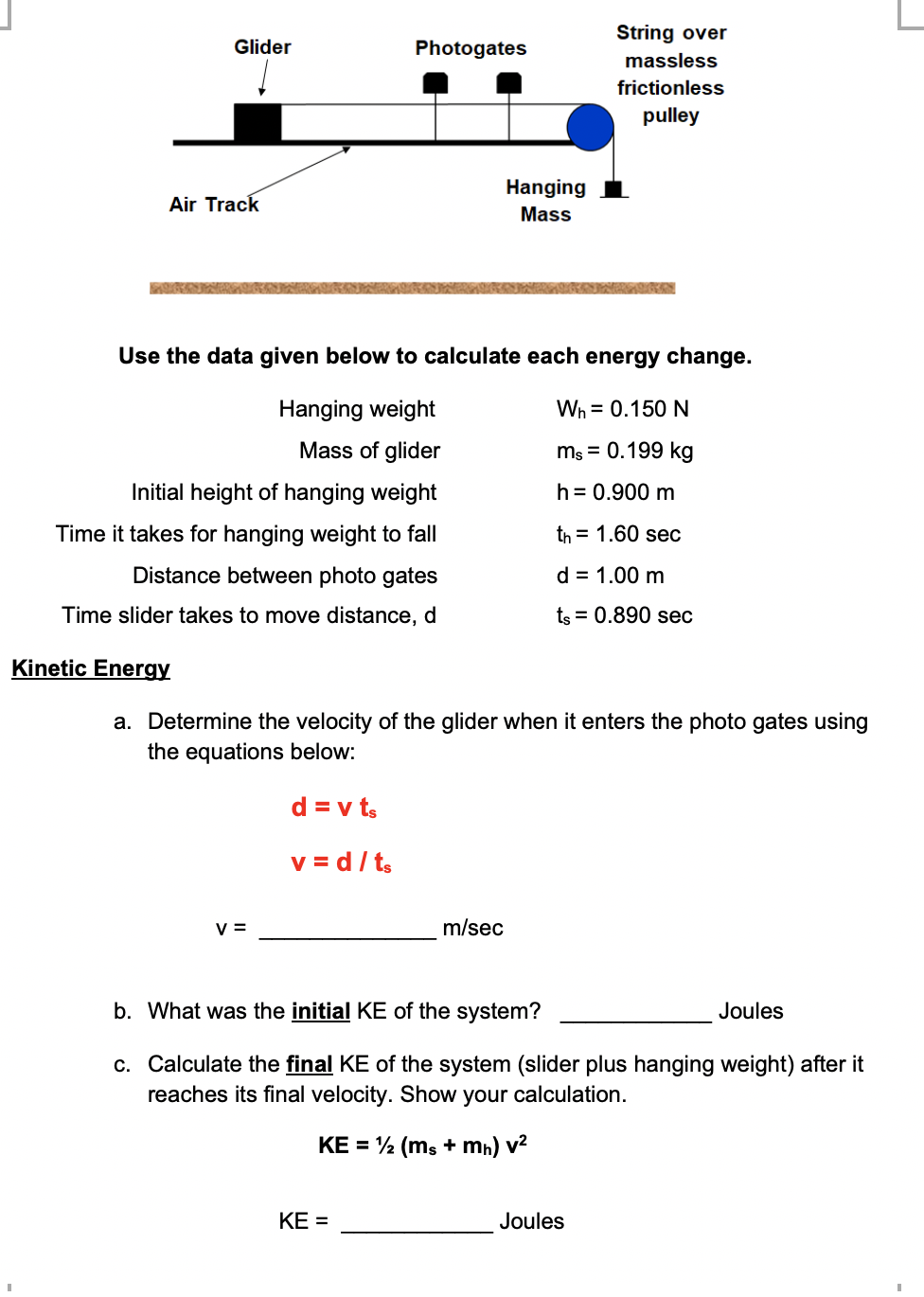
Source Image: chegg.com
Download Image
SOLVED: A .34 kg glider on an air track moving at 1.5 m/s collides with a .51 kg glider that is initially at rest. They collide and stick together. How fast are Description of the Experiment. Two gliders of different mass collide in various ways on a frictionless air track. Try and refine your model and invent new physical quantities (if necessary) to describe and explain what you see here. Youtube movies can be stepped frame by frame using the , and . keys on your keyboard.

Source Image: indosawedu.com
Download Image
Two Gliders Are On A Frictionless Level Air Track
Description of the Experiment. Two gliders of different mass collide in various ways on a frictionless air track. Try and refine your model and invent new physical quantities (if necessary) to describe and explain what you see here. Youtube movies can be stepped frame by frame using the , and . keys on your keyboard. Two gliders are on a frictionless, level air track. Initially, glider A moves to the right and the glider B is at rest. After the collision, glider A has reversed direction and moves to the left. Draw an arrow for each glider to represent the direction of the change in velocity from before to after the collision. Explain how you determined your
Linear Air Track with Timer
Question: Two gliders are on a frictionless. level air track. Initially, glider A moves to the right and glider B is at rest. After the collision, glider A has reversed direction and moves to the left. System C consists of both gliders A and B. SOLVED: Two gliders move toward each other on a linear air track (Figure 1), which we assume is frictionless. Glider A has a mass of 0.50 kg, and glider B has a
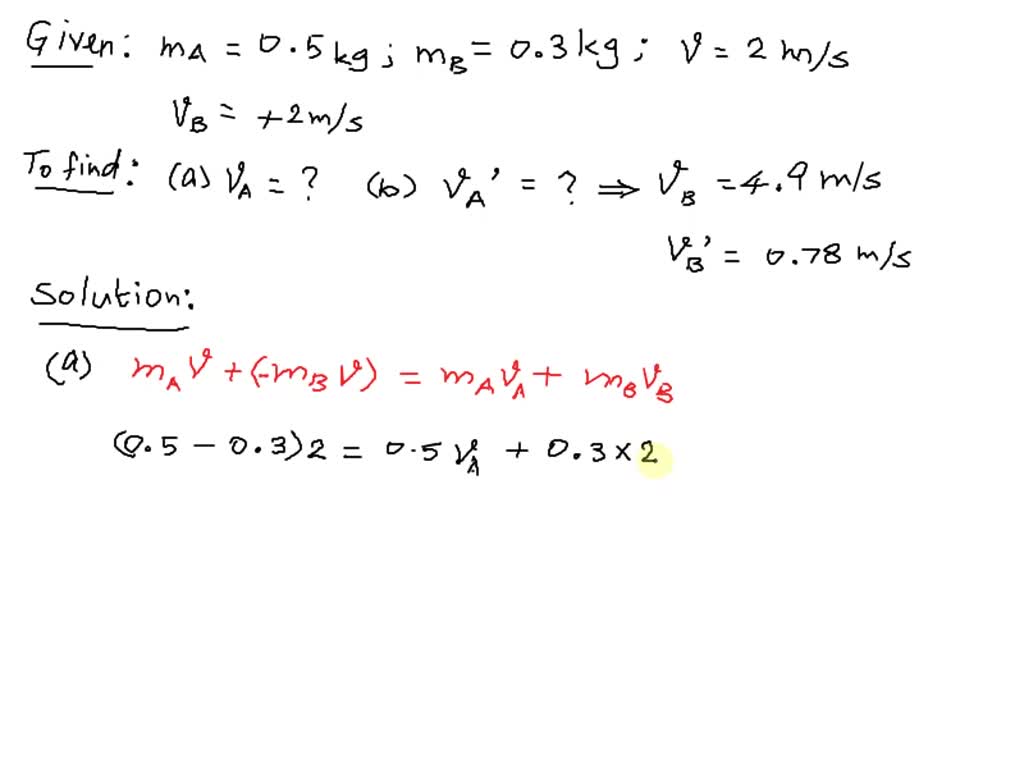
Source Image: numerade.com
Download Image
SOLVED: Two gliders are on a frictionless level air track. Initially, glider A moves toward the right and glider B is at rest. After the collision, glider A has reversed direction and Question: Two gliders are on a frictionless. level air track. Initially, glider A moves to the right and glider B is at rest. After the collision, glider A has reversed direction and moves to the left. System C consists of both gliders A and B.
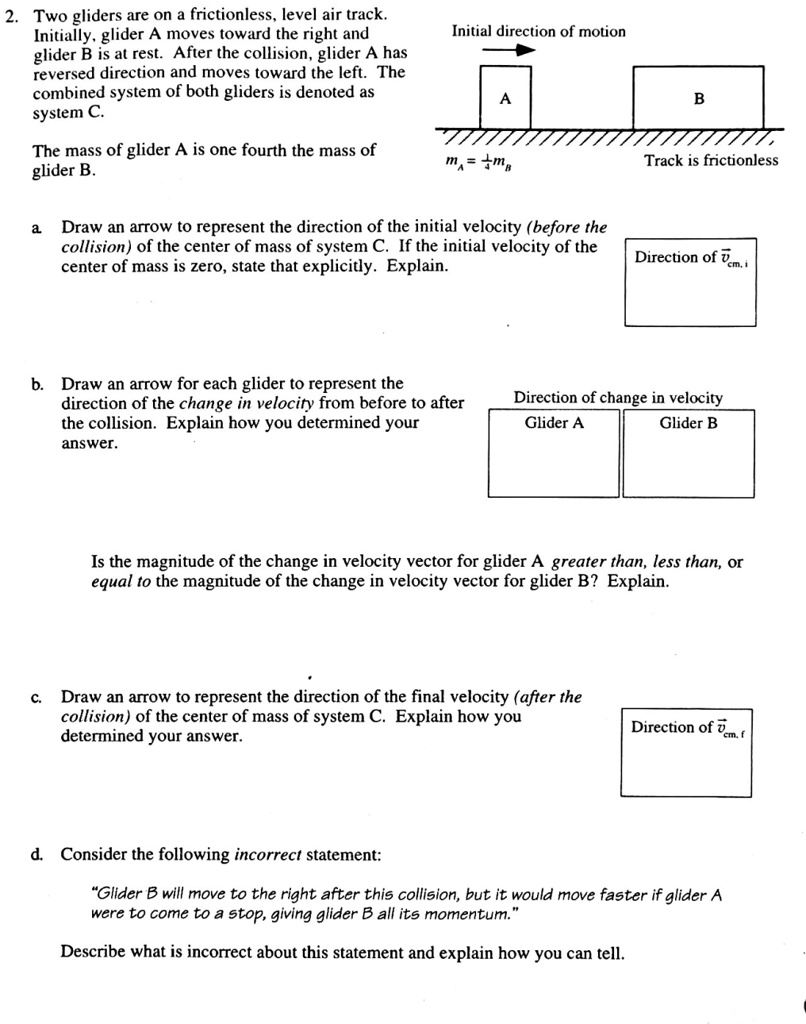
Source Image: numerade.com
Download Image
Ex2Su03 Dynamic Systems — Frictionless Track. Figure 1. Figure 2. Figure 3. Two setups are available: an airtrack with gliders of various masses and a grooved track with low-friction carts. The airtrack is connected to an air blower that creates an air “pillow” for the gliders. The low-friction carts are silent and can be loaded with additional

Source Image: ux1.eiu.edu
Download Image
SOLVED: A .34 kg glider on an air track moving at 1.5 m/s collides with a .51 kg glider that is initially at rest. They collide and stick together. How fast are 1. Weigh each glider to obtain its mass, and record the values in the \Data” section. 2. Attach (or tape) three 5-gram masses to the small glider, such that only the 5-gram mass holder accelerates the glider. Turn the air-track blower on, and set one glider on the track as far from the pulley as the thread allows.
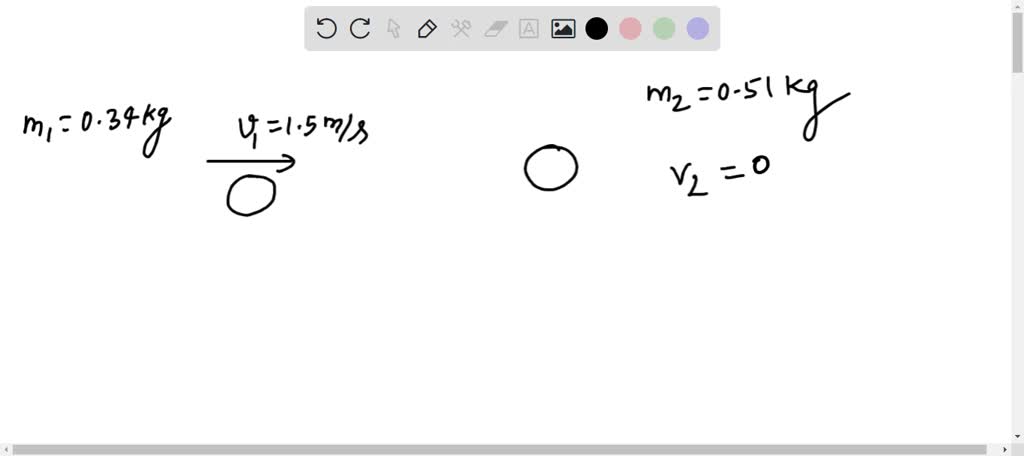
Source Image: numerade.com
Download Image
glider on air track with 20cm card and two light gates Stock Photo – Alamy Two gliders are on a frictionless level air track. Initially, glider A moves toward the right and glider B is at rest. After the collision, glider A has reversed direction and moves toward the left. The combined system of both gliders is denoted as system C. Initial direction of motion: The mass of glider A is one fourth the mass of glider B.
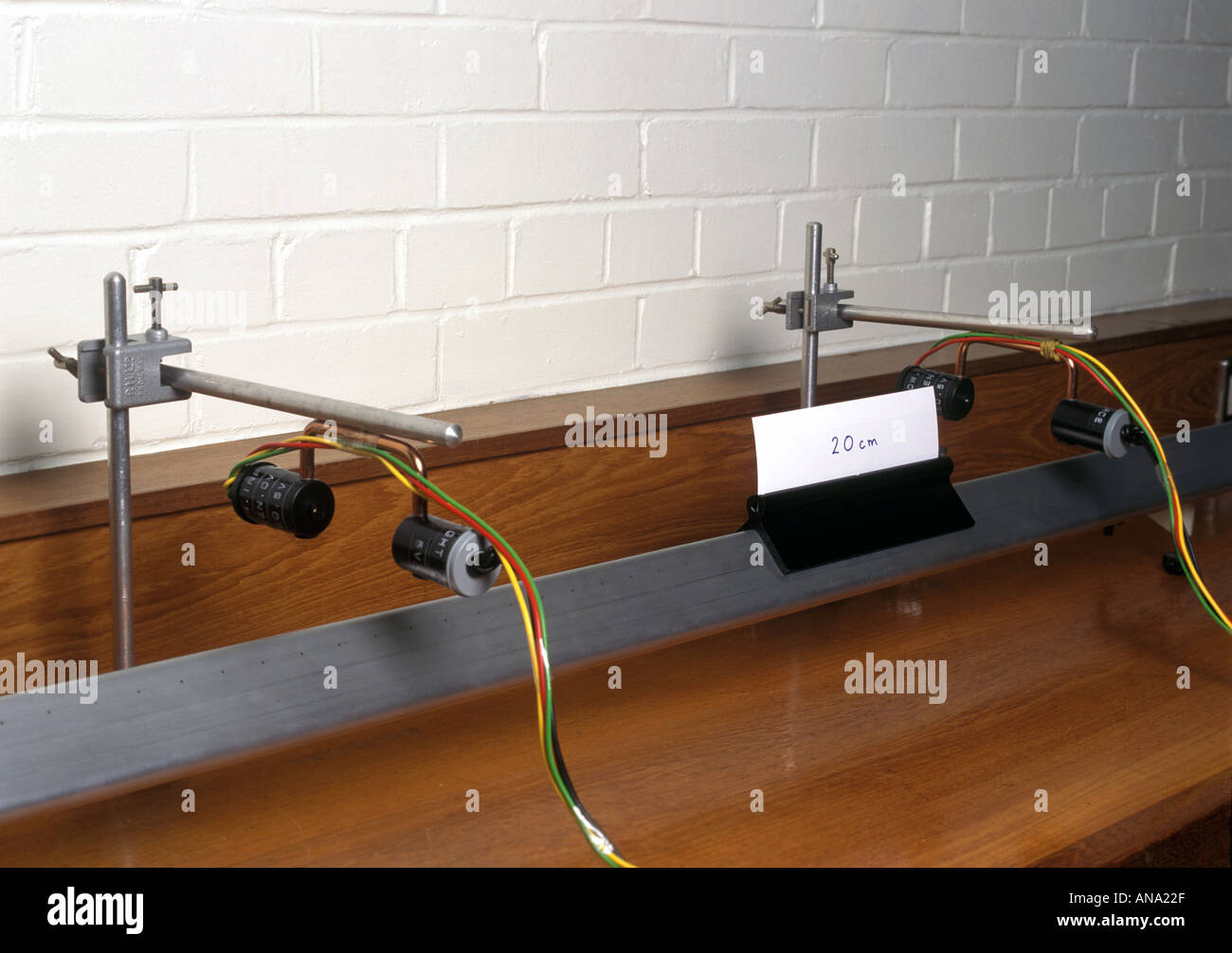
Source Image: alamy.com
Download Image
SOLVED: Two gliders are on a frictionless, level air track. Both gliders are free to move. Initially, glider A moves to the right and glider B is at rest. After the collision, Description of the Experiment. Two gliders of different mass collide in various ways on a frictionless air track. Try and refine your model and invent new physical quantities (if necessary) to describe and explain what you see here. Youtube movies can be stepped frame by frame using the , and . keys on your keyboard.

Source Image: numerade.com
Download Image
3A20.35 Air Track Glider Between Springs – Physics Demos Two gliders are on a frictionless, level air track. Initially, glider A moves to the right and the glider B is at rest. After the collision, glider A has reversed direction and moves to the left. Draw an arrow for each glider to represent the direction of the change in velocity from before to after the collision. Explain how you determined your
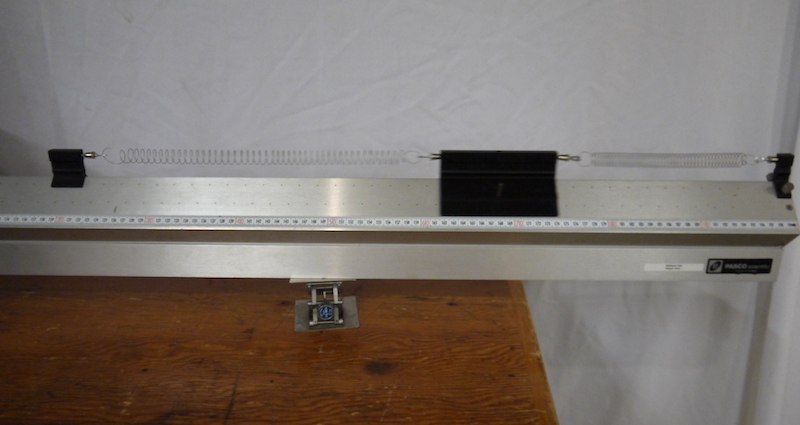
Source Image: physicsdemos.site.wesleyan.edu
Download Image
SOLVED: Two gliders are on a frictionless level air track. Initially, glider A moves toward the right and glider B is at rest. After the collision, glider A has reversed direction and
3A20.35 Air Track Glider Between Springs – Physics Demos A glider weighs a mass of 0.346 kg. The glider moves frictionless along an air track that has been tilted by 1.5 inches over a span of 1.00 meters. What is the expected acceleration of the glider? Two gliders on a frictionless air track the first weigh 0.200 kg and have a velocity of +1.00 m/s.
SOLVED: A .34 kg glider on an air track moving at 1.5 m/s collides with a .51 kg glider that is initially at rest. They collide and stick together. How fast are SOLVED: Two gliders are on a frictionless, level air track. Both gliders are free to move. Initially, glider A moves to the right and glider B is at rest. After the collision, Two gliders are on a frictionless level air track. Initially, glider A moves toward the right and glider B is at rest. After the collision, glider A has reversed direction and moves toward the left. The combined system of both gliders is denoted as system C. Initial direction of motion: The mass of glider A is one fourth the mass of glider B.